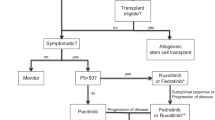Abstract
Ruxolitinib, formerly known as INCB018424 or INC424, is a potent and selective oral inhibitor of JAK1 and JAK2. Ruxolitinib has been approved for the treatment of myelofibrosis, which is characterized, biologically, by the activation of the JAK-STAT pathway and, clinically, by bone marrow fibrosis, splenomegaly, abnormal blood counts, and poor quality-of-life through associated symptoms. Ruxolitinib treatment results in a meaningful reduction in spleen size and symptom burden in the majority of myelofibrosis patients, and it may also have a favorable effect on survival. Treatment response apparently does not depend on the presence of a JAK2 V617F mutation. The predominant toxicities are thrombocytopenia and anemia. The metabolization of ruxolitinib through CYP3A4 needs to be considered particularly if co-administered with potent CYP3A4 inhibitors. Several further JAK inhibitors are currently studied in myelofibrosis or other immuno-inflammatory diseases.
Access this chapter
Tax calculation will be finalised at checkout
Purchases are for personal use only
Similar content being viewed by others
References
Cervantes F, Dupriez B, Pereira A et al (2009) New prognostic scoring system for primary myelofibrosis based on a study of the International Working Group for Myelofibrosis Research and Treatment. Blood 113(13):2895–2901
Harrison C, Kiladjian JJ, Al-Ali HK et al (2012a) JAK inhibition with ruxolitinib versus best available therapy for myelofibrosis. N Engl J Med 366(9):787–798
Harrison CN, Gisslinger H, Miller CB et al (2012b) Expand: a phase 1b, open-label, dose-finding study of ruxolitinib in patients with myelofibrosis and baseline platelet counts between 50 × 109/L and 99 × 109/L. Blood 120 (abstract 177) (ASH Annual Meeting Abstracts)
James C, Ugo V, Le Couédic JP et al (2005) A unique clonal JAK2 mutation leading to constitutive signalling causes polycythaemia vera. Nature 434(7037):1144–1148
Mascarenhas J, Hoffman R (2013) A comprehensive review and analysis of the effect of ruxolitinib therapy on the survival of patients with myelofibrosis. Blood 121(24):4832–4837
Mertens C, Darnell JE Jr (2007) SnapShot: JAK-STAT signaling. Cell 131(3):612
Mesa RA, Yasothan U, Kirkpatrick P (2012) Ruxolitinib. Nat Rev Drug Discov 11(2):103–104
Mesa RA, Gotlib J, Gupta V et al (2013) Effect of ruxolitinib therapy on myelofibrosis-related symptoms and other patient-reported outcomes in COMFORT-I: a randomized, double-blind, placebo-controlled trial. J Clin Oncol 31(10):1285--1292
Quintás-Cardama A, Vaddi K, Liu P et al (2010) Preclinical characterization of the selective JAK1/2 inhibitor INCB018424: therapeutic implications for the treatment of myeloproliferative neoplasms. Blood 115(15):3109–3117
Shi JG, Chen X, Emm T et al (2012) The effect of CYP3A4 inhibition or induction on the pharmacokinetics and pharmacodynamics of orally administered ruxolitinib (INCB018424 phosphate) in healthy volunteers. J Clin Pharmacol 52(6):809–818
Shilling AD, Nedza FM, Emm T et al (2010) Metabolism, excretion, and pharmacokinetics of [14C] INCB018424, a selective Janus tyrosine kinase 1/2 inhibitor, in humans. Drug Metab Dispos 38(11):2023–2031
Talpaz M, Hamburg SI, Jamieson K et al (2012a) Preliminary safety and efficacy from a phase II stud of ruxolitinib in patients with primary and secondary myelofibrosis with platelet counts of 50–100 × 109/L. Haematologica 97(s1):245 (abstract 0597)
Talpaz M, Paquette R, Afrin L et al (2012b) Efficacy, hematologic effects, and dose of ruxolitinib in myelofibrosis patients with low starting platelet counts (50–100 × 109/L): a comparison to patients with normal or high starting platelet counts. Blood 120 (abstract 176) (ASH Annual Meeting Abstracts)
Tefferi A, Pardanani A (2011) Serious adverse events during ruxolitinib treatment discontinuation in patients with myelofibrosis. Mayo Clin Proc 86(12):1188–1191
Tefferi A, Litzow MR, Pardanani A (2011) Long-term outcome of treatment with ruxolitinib in myelofibrosis. N Engl J Med 365(15):1455–1457
Vannucchi A, Cervantes F, Niederwieser D et al (2013) Long-term outcomes from a phase 3 study comparing ruxolitinib with best available therapy (BAT) for the treatment of myelofibrosis (MF): a 3-year update of COMFORT-II. Haematologica 98(s1):456 (abstract S1111)
Verstovsek S, Kantarjian H, Mesa RA et al (2010) Safety and efficacy of INCB018424, a JAK1 and JAK2 inhibitor, in myelofibrosis. N Engl J Med 363(12):1117–1127
Verstovsek S, Kantarjian HM, Estrov Z et al (2012a) Long-term outcomes of 107 patients with myelofibrosis receiving JAK1/JAK2 inhibitor ruxolitinib: survival advantage in comparison to matched historical controls. Blood 120(6):1202–1209
Verstovsek S, Mesa RA, Gotlib J et al (2012b) A double-blind, placebo-controlled trial of ruxolitinib for myelofibrosis. N Engl J Med 366(9):799–807
Verstovsek S, Mesa RA, Gotlib J, et al (2012c) Long-term outcome of ruxolitinib treatment in patients with myelofibrosis: durable reductions in spleen volume, improvements in quality of life, and overall survival advantage in COMFORT-I. Blood 120 (abstract 800) (ASH Annual Meeting Abstracts)
Verstovsek S, Mesa RA, Gotlib J et al (2013) The clinical benefit of ruxolitinib across patient subgroups: analysis of a placebo-controlled, Phase III study in patients with myelofibrosis. Br J Haematol 161(4):508–516
Author information
Authors and Affiliations
Corresponding author
Editor information
Editors and Affiliations
Rights and permissions
Copyright information
© 2014 Springer-Verlag Berlin Heidelberg
About this chapter
Cite this chapter
Becker, H., Engelhardt, M., von Bubnoff, N., Wäsch, R. (2014). Ruxolitinib. In: Martens, U. (eds) Small Molecules in Oncology. Recent Results in Cancer Research, vol 201. Springer, Berlin, Heidelberg. https://doi.org/10.1007/978-3-642-54490-3_16
Download citation
DOI: https://doi.org/10.1007/978-3-642-54490-3_16
Published:
Publisher Name: Springer, Berlin, Heidelberg
Print ISBN: 978-3-642-54489-7
Online ISBN: 978-3-642-54490-3
eBook Packages: MedicineMedicine (R0)



